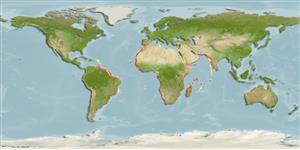Common names from other countries
Environment: milieu / climate zone / depth range / distribution range
Sinh thái học
; Mức độ sâu 0 - 50 m (Ref. 101292). Tropical; 10°C - 30°C (Ref. 113750), preferred 26°C (Ref. 107945); 37°N - 35°S, 64°W - 82°E
Western Indian Ocean, Atlantic Ocean and the Mediterranean Sea: from the southern Caribbean to Uruguay, eastern Atlantic from Portugal to Senegal, and Congo to South Africa, and in the western Indian Ocean from South Africa to Sri Lanka. Introduced in the Gulf of Mexico. Tropical and subtropical.
Length at first maturity / Bộ gần gũi / Khối lượng (Trọng lượng) / Age
Maturity: Lm ? range ? - ? cm Max length : 17.0 cm SHL con đực/không giới tính; (Ref. 271)
Shell mussel-shaped, ventral margin straight, posterior end rounded. Shell surface smooth except for fine growth lines. Hinge 1 or 2 teeth. Periostracum flaky. Colour: externally brown or light brown with concentric yellow bands near ventral margin, internally purple, nacreous.
It is heavily exploited commercially, stocks are dwindling in southernmost part or range. Consumed boiled in juices, marinated, grilled with rice, or in a number of different local dishes. Canned industrially (Ref. 271). Minimum depth from Ref. 104365.
Life cycle and mating behavior
Chín muồi sinh dục | Sự tái sinh sản | Đẻ trứng | Các trứng | Sự sinh sản | Ấu trùng
Members of the class Bivalvia are mostly gonochoric, some are protandric hermaphrodites. Life cycle: Embryos develop into free-swimming trocophore larvae, succeeded by the bivalve veliger, resembling a miniature clam.
Carpenter, K.E. (ed.). 2002. (Ref. 271)
IUCN Red List Status (Ref. 130435: Version 2024-1)
CITES status (Ref. 108899)
Not Evaluated
Not Evaluated
Human uses
Các nghề cá: tính thương mại cao
FAO - Nuôi trồng thủy sản: Sản xuất; Các nghề cá: landings | FishSource | Biển chung quanh ta
Các công cụ
Các nguồn internet
Estimates based on models
Preferred temperature
(Ref.
115969): 14.8 - 27.8, mean 24.9 (based on 654 cells).
Thích nghi nhanh
Chiêù cao, thời gian nhân đôi của chủng quần tối thiểu là dưới 15 tháng (K=0.06-1.5).
Vulnerability
Low to moderate vulnerability (29 of 100).
